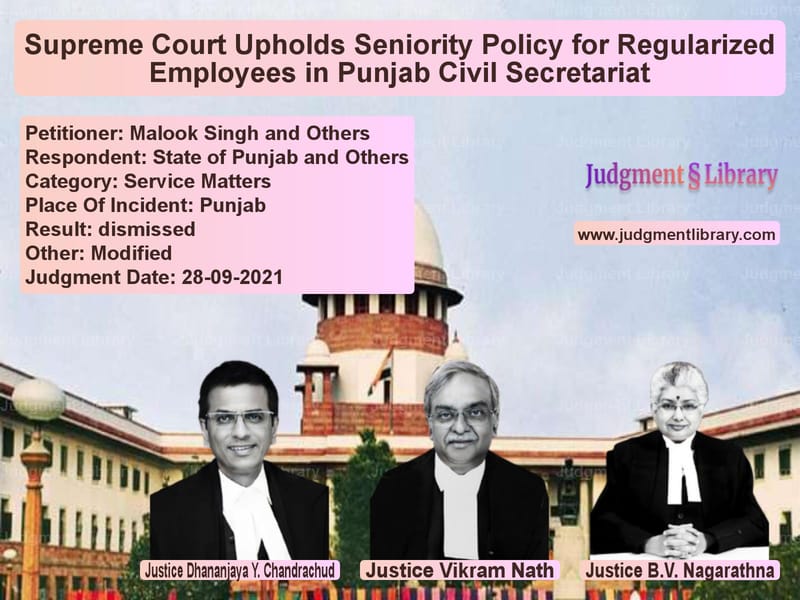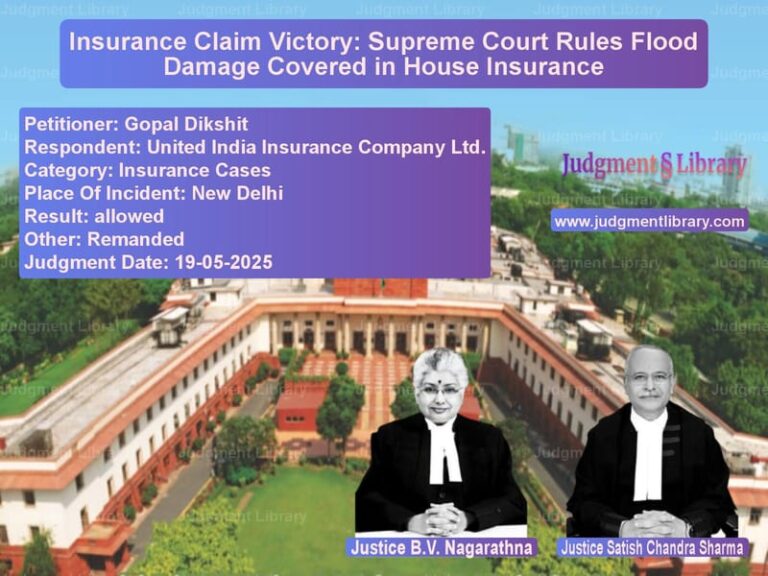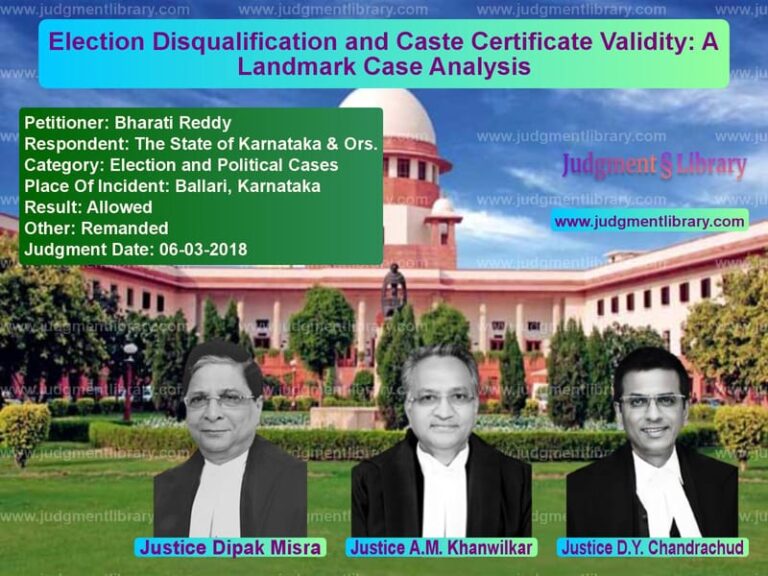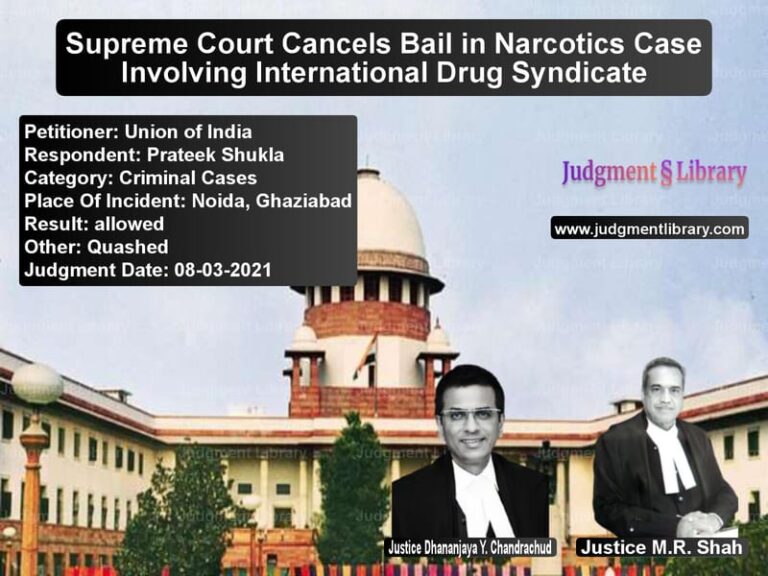Supreme Court Upholds Seniority Policy for Regularized Employees in Punjab Civil Secretariat
The Supreme Court recently adjudicated on a crucial dispute concerning seniority determination for employees in the Punjab Civil Secretariat. The case revolved around whether ad hoc service should be counted for seniority calculations following the regularization of employees. The ruling carries significant implications for public sector employment policies and sets a precedent for similar disputes.
Background of the Case
The appellants were appointed as clerks on an ad hoc basis in the Punjab Civil Secretariat in 1975-76. Their services were subsequently regularized on April 1, 1977, as per the state’s policy. This policy provided that while the regularization date would be uniform, the seniority among ad hoc employees would be determined based on the length of their prior service.
The dispute arose when candidates who were appointed after April 1, 1977, through a formal selection process claimed that their seniority should not be affected by the earlier ad hoc appointments. The issue led to a series of legal battles culminating in the present appeal before the Supreme Court.
Legal Issues Considered
- Whether ad hoc service should be counted for seniority determination after regularization.
- Whether the principle of res judicata applied, given prior litigation on the same issue.
- Whether the state government could be compelled to revise seniority lists retrospectively.
Arguments by the Appellants
- The appellants argued that the 1977 policy explicitly provided for the inclusion of ad hoc service in determining inter se seniority among regularized employees.
- They relied on a previous ruling in Malook Singh v. State of Punjab, which recognized the validity of counting ad hoc service.
- The appellants contended that revising the seniority list would cause undue hardship, especially since many of them had already retired.
- They sought a directive preventing the state from recovering any financial benefits they had received based on the existing seniority list.
Arguments by the Respondents
- The state and other respondents argued that ad hoc appointments were made as a stopgap arrangement and did not follow the due selection process.
- They contended that the seniority list should be based solely on the date of regularization and subsequent merit-based selection.
- The respondents relied on later rulings, including Gurmail Singh v. State of Punjab, which overruled the decision in Malook Singh and held that ad hoc service could not be counted for seniority.
- The respondents also cited Supreme Court precedents, emphasizing that appointments made without adherence to Articles 14 and 16 of the Constitution should not confer any advantage in terms of seniority.
Supreme Court’s Observations
The Supreme Court, comprising Justices Dhananjaya Y. Chandrachud, Vikram Nath, and B.V. Nagarathna, made the following key observations:
- The 1977 policy clearly defined seniority rules for regularized employees, distinguishing between those appointed before and after April 1, 1977.
- The principle laid down in Direct Recruit Class II Engineering Officers’ Association v. State of Maharashtra was reaffirmed: “Where initial appointment is only ad hoc and not according to rules, officiation in such post cannot be taken into account for seniority.”
- The judgment in Malook Singh was not binding on employees who were not parties to that case.
- Revising the seniority list at this stage would create practical difficulties, as most employees had already retired.
Final Judgment
The Supreme Court upheld the Punjab and Haryana High Court’s decision that ad hoc service should not be counted for seniority determination. However, it provided relief to the appellants by directing that:
- The pensionary benefits of retired employees would not be disturbed.
- No recoveries would be made from the appellants for any financial benefits received based on the earlier seniority list.
- The matter would be deemed closed to avoid further litigation.
Conclusion
This ruling clarifies that ad hoc appointments, unless made through a proper selection process, do not grant seniority benefits upon regularization. It reinforces the importance of merit-based appointments and procedural fairness in public sector employment.
While the judgment upholds the principle that ad hoc service cannot be counted for seniority, it also recognizes the practical difficulties of retrospective corrections. By protecting pensionary benefits and preventing recoveries, the Court balanced the interests of justice with administrative feasibility.
Petitioner Name: Malook Singh and Others.Respondent Name: State of Punjab and Others.Judgment By: Justice Dhananjaya Y. Chandrachud, Justice Vikram Nath, Justice B.V. Nagarathna.Place Of Incident: Punjab.Judgment Date: 28-09-2021.
Don’t miss out on the full details! Download the complete judgment in PDF format below and gain valuable insights instantly!
Download Judgment: malook-singh-and-oth-vs-state-of-punjab-and-supreme-court-of-india-judgment-dated-28-09-2021.pdf
Directly Download Judgment: Directly download this Judgment
See all petitions in Employment Disputes
See all petitions in Promotion Cases
See all petitions in Public Sector Employees
See all petitions in Judgment by Dhananjaya Y Chandrachud
See all petitions in Judgment by Vikram Nath
See all petitions in Judgment by B.V. Nagarathna
See all petitions in dismissed
See all petitions in Modified
See all petitions in supreme court of India judgments September 2021
See all petitions in 2021 judgments
See all posts in Service Matters Category
See all allowed petitions in Service Matters Category
See all Dismissed petitions in Service Matters Category
See all partially allowed petitions in Service Matters Category







